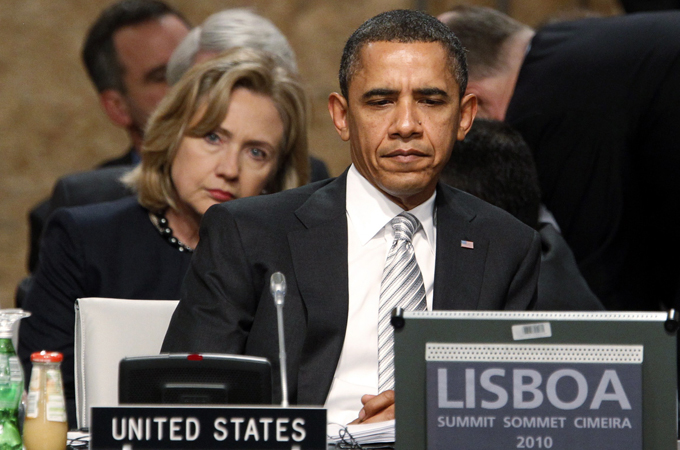WikiLeaks ‘hacked’ before release
Whistle-blower website says first batch of US files to be revealed by five media houses on Sunday despite online attack.

 |
| The US state department has worked to contain the potential fallout from the secret diplomatic cables [Reuters] |
WikiLeaks has said that its website has been compromised, just hours before the expected release of a tranche of secret US diplomatic documents.
“We are currently under a mass distributed denial of service attack,” Wikileaks said on its Twitter page.
But WikiLeaks said that five publications “will publish many US embassy cables tonight” even if the website goes down.
Meanwhile, Julian Assange, the founder of WikiLeaks, has said the imminent release of the classified documents by the whistle-blower website will amount to a “diplomatic history” of global affairs.
“The material that we are about to release covers essentially every major issue in every country,” Assange told reporters in Jordan by video link from an undisclosed location on Sunday.
WikiLeaks is reportedly hours away from releasing hundreds of thousands of confidential US diplomatic cables, with several governments fearing damaging revelations.
US officials took the unusual step on Saturday of sending a letter to WikiLeaks to warn against the release of the secret government documents, which it says will put “countless” lives at risk.
The letter, from Harold Hongju Koh, the US state department’s top lawyer, argued that publishing the classified files would threaten counterterrorism operations and jeopardise US relations with its allies.
“No single individual has even come to harm as a result of anything that we have ever published,” Assange said on Sunday.
The classified documents reportedly cover correspondence between US diplomatic missions abroad and the state department in Washington and could reveal “unflattering” views that American officials held about close EU allies and countries like Russia and Turkey.
US diplomats have been visiting foreign ministries hoping to stave off anger over the cables, which are internal messages that often lack the niceties diplomats voice in public.
WikiLeaks has said the newest release will be seven times the size of the October publication of 400,000 Iraq war documents, the biggest leak to date in US intelligence history.
The site also published 77,000 classified US files on the Afghan conflict in July.
‘Violation of US law’
In his letter, Koh said the release will “place at risk the lives of countless innocent individuals,” “place at risk on-going military operations,” and “place at risk on-going cooperation between countries”.
“You have undermined your stated objective by disseminating this matieral widely, without redaction, and without regard to the security and sanctity of the lives your actions endanger,” he wrote.
Koh said WikiLeaks should return them to the US government and destroy any copies in its possession or in computer databases.
|
Steve Clemons discusses the diplomatic ramifications of the leak with Al Jazeera |
“They were provided in violation of US law and without regard for the grave consequences of this action,” he said.
The letter also said the US government would not cooperate with WikiLeaks in trying to scrub the cables of information that might put sources and methods of intelligence gathering and diplomatic reporting at risk.
Steve Clemons, a political strategist and director of the American Strategy Programme in Doha, told Al Jazeera that the US reaction to this latest round of leaks has been stronger than in the past because of mainly diplomatic concerns.
“Certainly I wouldn’t take it to the level of lives lost on the battlefield. This is essentially diplomatic brouhaha,” he said.
“I think also that the content of these documents is a lot about the gossip and innuendo and the nuance … and there are going to be a lot of embarrassing things that come out of these documents.
“There are be political repercussions of the way foreign leaders are going to read these documents. And in that sense, you’re going to see people, ranging from have everyone from [Asif Ali] Zardari In Pakistan, to, I understand, Nelson Mandela of South Africa has had some bad swipes taken at him in these cables.”
Whatever the consequences for the US, Clemons said the leaks are highlighting the extent to which governments’ reliance on secrecy has become so pervasive.
“Governments have been trying to hide themselves from embarrassment. And I think that’s what WikiLeaks is trying to create a market reaction to and trying to change.”
‘Diplomatic catastrophe’
The document release will contain more than 250,000 cables and 8,000 diplomatic directives – mostly from the last five years.
According to White House sources cited by a correspondent of the US website Politico, none of the documents are classified as ‘Top Secret’. But reportedly six per cent are listed as “secret” and 40 per cent as “confidential”.
Less than five per cent of the files are about EU nations, according to OWNI, a French news site with a live blog covering the “StateLogs”.
Speculation has swirled on the inclusion of cables about US ties to separatist groups in Turkey, perceptions of the UK coalition government, and allegedly corrupt politicians in several countries.
The documents could include reports from officials in Washington and diplomatic posts around the world about issues on which Britain and the US have collaborated closely, including the wars in Iraq and Afghanistan.
Members of the former Labour administrations of Gordon Brown and Tony Blair were bracing for the flood of millions of documents.
Franco Frattini, Italy’s foreign minister, said he did not know the content of the files to be released but warned they would “blow up the relationship of trust between states”, according to Italian news agencies.
“It will be the September 11th of world diplomacy,” he said, adding that the release would be the product of “a criminal activity that has already been prosecuted in 10 countries, including the United States”.
“I hope Italian magistrates will also look into the matter.”